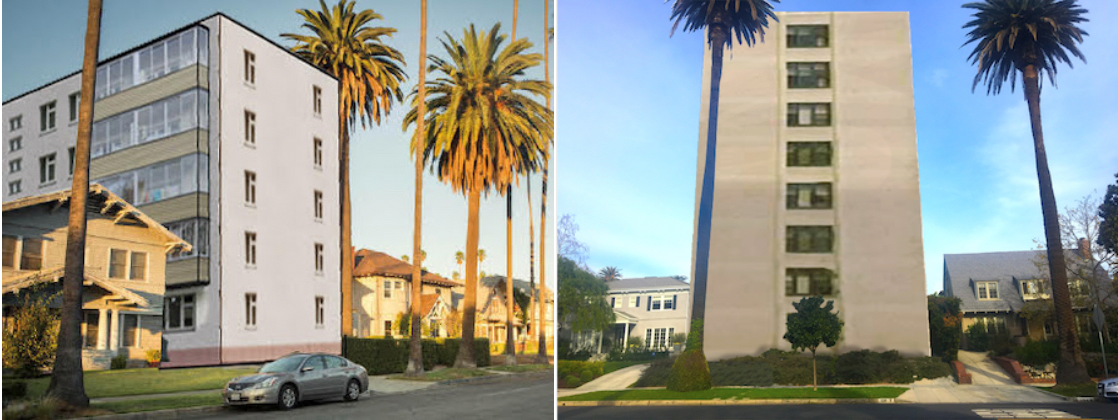Editor’s Note – This News was Published in June – Bills Have Changed – This Article is now Obsolete.
For the latest Bill Information See our ACT page HERE
Sacramento is trying to revive the hated SB 50 via 9 Bad Bills. Without your intervention, by contacting your own senator and your own assemblymember, many of the 9 Bad Bills may be approved by the senate or assembly in the coming days.
The divisive and now-dead SB 50, by Bay Area state Sen. Scott Wiener, would have banned single-family zoning, allowed 10-unit luxury apartments on ANY residential block, and allowed apartments several stories high in low-density communities.
The 9 Bad Bills of 2020 do this — by piecemealing. You are the key to stopping the 9 Bad Bills. Send a letter to the 15 most important legislators (click on highlighted areas below) TODAY, and set a time NOW TO TALK TO OR MEET your state senator or assembly member OR their district staff via Zoom or phone. If you ask, they will LIKELY agree. Find your legislators here: http://findyourrep.legislature.ca.gov/
You won’t see these 9 Bad Bills in the news. Understandably, almost ALL media are covering protests, calls for reform and the Covid-19 pandemic. Several of the bills REDUCE the legislature’s commitment to affordable housing, favoring luxury housing. This is wrong. The bills ban single-family zoning statewide. Allow 9-story buildings next to your homes. Target brown and black homeowner areas with gentrification and upheaval. Take an aspirin, and read on:
SB 1120 (by Scott Wiener and Toni Atkins)
Crushes single-family zoning, a threat to 8 million homeowners at all income levels. State Sen. Scott Wiener has called yards and single-family homes “immoral.” SB 1120 allows 4 market-rate homes where a one home now stands (it allows 8 units, if cities have local city “granny flat” laws). Requires NO affordability! Opens California to speculation frenzy.
SB 902 (by Scott Wiener):
Allows a majority on any city council to overturn voter-approved ballot measures that protect open space, shorelines and other lands — killing a 108-year-old California voter right. AND allows any city council to rezone “any parcel” to 10-unit luxury apartments, overriding all other zoning, inviting upheaval in older, diverse, multi-family areas. Requires NO affordability! Opens California to speculation frenzy.
SB 995 (by Wiener and Atkins):
This phony housing bill actually rewards huge $15M commercial projects with housing stuck on the side! While enriching commercial developers, it requires only 15% of its housing units to be affordable. It weakens CEQA, our environmental law.
SB 1085 (by Nancy Skinner):
This bill was substantially amended on July 29 in the Assembly Housing Committee after Livable California and many groups criticized it for CUTTING IN HALF the legislature’s commitment to affordable housing in “Density Bonus” projects. The new wording for this bill has not yet been published. We will UPDATE THIS SPACE as soon as we get a chance to read and analyze the amended SB 1085.
AB 725: (by Buffy Wicks and Scott Wiener)
A severe threat to 400+ cities who have not attracted enough housing to hit state-ordered growth targets known as “RHNA.” AB 725 bring density and upheaval to low-density areas whose residents have never even heard of “RHNA.” “RHNA” was once a helpful growth-forecasting tool. Now it’s used (especially by Scott Wiener) as a weapon to force density on communities.
AB 1279 (by Richard Bloom):
A year AFTER this radical bill becomes law, a “committee” would identify streets as “Opportunity Areas” where 50-unit to 120-unit apartments could be built, ignoring zoning as long as affordable units are included. OR developers can pay a woefully insufficient “in lieu” fee to AVOID building affordable housing, and then built 10-unit luxury apartments on single-family and low-density streets in these unsuspecting “Areas.” All without a single hearing. This is wrong.
AB 2345 (by Lorena Gonzalez and David Chiu)
Allows developers to add 50% in “Density Bonus” size to a building if they agree to provide more affordable housing units than required under “Density Bonus.” To create these huge buildings, developers can ignore city controls on size, parking, setbacks, side yards, trees, and other local standards.
AB 3040 (by David Chiu):
It’s a “Sophie’s Choice”: Cities comply with AB 3040 by sacrificing single-family homes older than 15 years — think South L.A., East L.A., and diverse older suburbs — to satisfy state growth dictates known as “RHNA.” OR cities can refuse to comply and try to meet these growth dictates by relying on the state Density Bonus program. Stay with us here, folks: Unfortunately, the Density Bonus program is a FAIL, preventing cities from approving even close to the number of affordable units required by “RHNA.” More than 400 of our 482 cities won’t make the “RHNA” targets. When cities fail, a divisive and punitive law by Scott Wiener, called SB 35, will let developers ignore many local rules to build as they wish. Yes, “Sophie’s Choice.”
AB 3107 (by Richard Bloom and Phil Ting):
Wreaks havoc by allowing apartment towers where cafés, shops or businesses now stand, even if adjacent to homes. The new towers would contain 20% affordable units. Each city faces a different fate — the bill arbitrarily allow heights that match the tallest height allowed in any commercial or residential area up to ½ mile away. In L.A. it means 9-story apartments citywide. In Inglewood, 75 feet would be allowed. In Manhattan Beach, it wipes out a residential 30-foot height limit to allow 99 feet. We predict chaos.

